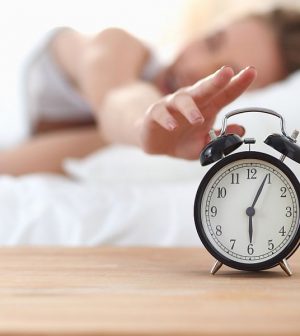- Could Your Grocery Store Meat Be Causing Recurring UTIs?
- Are You Making This Expensive Thermostat Error This Winter?
- Recognizing the Signs of Hypothyroidism
- 10 Strategies to Overcome Insomnia
- Could Artificial Sweeteners Be Aging the Brain Faster?
- Techniques for Soothing Your Nervous System
- Does the Water in Your House Smell Funny? Here’s Why
- Can a Daily Dose of Apple Cider Vinegar Actually Aid Weight Loss?
- 6 Health Beverages That Can Actually Spike Your Blood Sugar
- Treatment Options for Social Anxiety Disorder
Keep a Spring in Your Step With Sunday’s Time Change

Come Sunday morning, the clocks will jump ahead one hour, but experts say there are ways to take the sting out of that lost hour of sleep.
“Setting the clock ahead in the spring is harder than sleeping an extra hour in the fall,” said Dr. Steven Feinsilver, director of the Center for Sleep Medicine at Lenox Hill Hospital in New York City.
“Humans have an inherent circadian rhythm (‘body clock’) that helps regulate sleep and wakefulness. Trying to change this by more than one hour in a 24-hour period is difficult,” he explained. “This is an annual opportunity for all of us to feel a little challenged by our biological clocks.”
Luckily, there are things you can do beforehand to ease the transition, Feinsilver said.
Pick a time to wake up, and don’t waver, he said. Getting outside in the morning, and exposing yourself to natural light, can also help. Exercise in the morning, and not in the two to three hours before bedtime, he added.
Avoid alcohol, cellphones and computers before bedtime, since none of those things promote restful sleep. Keep your bedroom dark and quiet, and stick to sleep only in your bed, he said.
If you do wake up during the night, try to do something relaxing that will help you fall back asleep, but still get up at the same time every morning, Feinsilver added.
Another sleep expert offered this analogy of the time change: “It’s like flying from Chicago to New York, and good sleepers may not even notice a difference,” said Saul Rothenberg. He’s a behavioral sleep medicine specialist at Northwell Health in Great Neck, N.Y.
“But if you’re prone to [having] difficulty falling asleep, you might notice being less sleepy at bedtime on Sunday or Monday nights, or feel more tired at your usual wake-up time, at least for the first few days,” he added.
How do you combat that?
Don’t sleep in on Sunday morning and resist the urge to take a nap that afternoon, Rothenberg said. Get more morning light, and don’t fret if it takes a few days to adjust to the time change.
More information
Visit the U.S. National Institutes of Health for more about healthy sleep.
Source: HealthDay
Copyright © 2026 HealthDay. All rights reserved.










